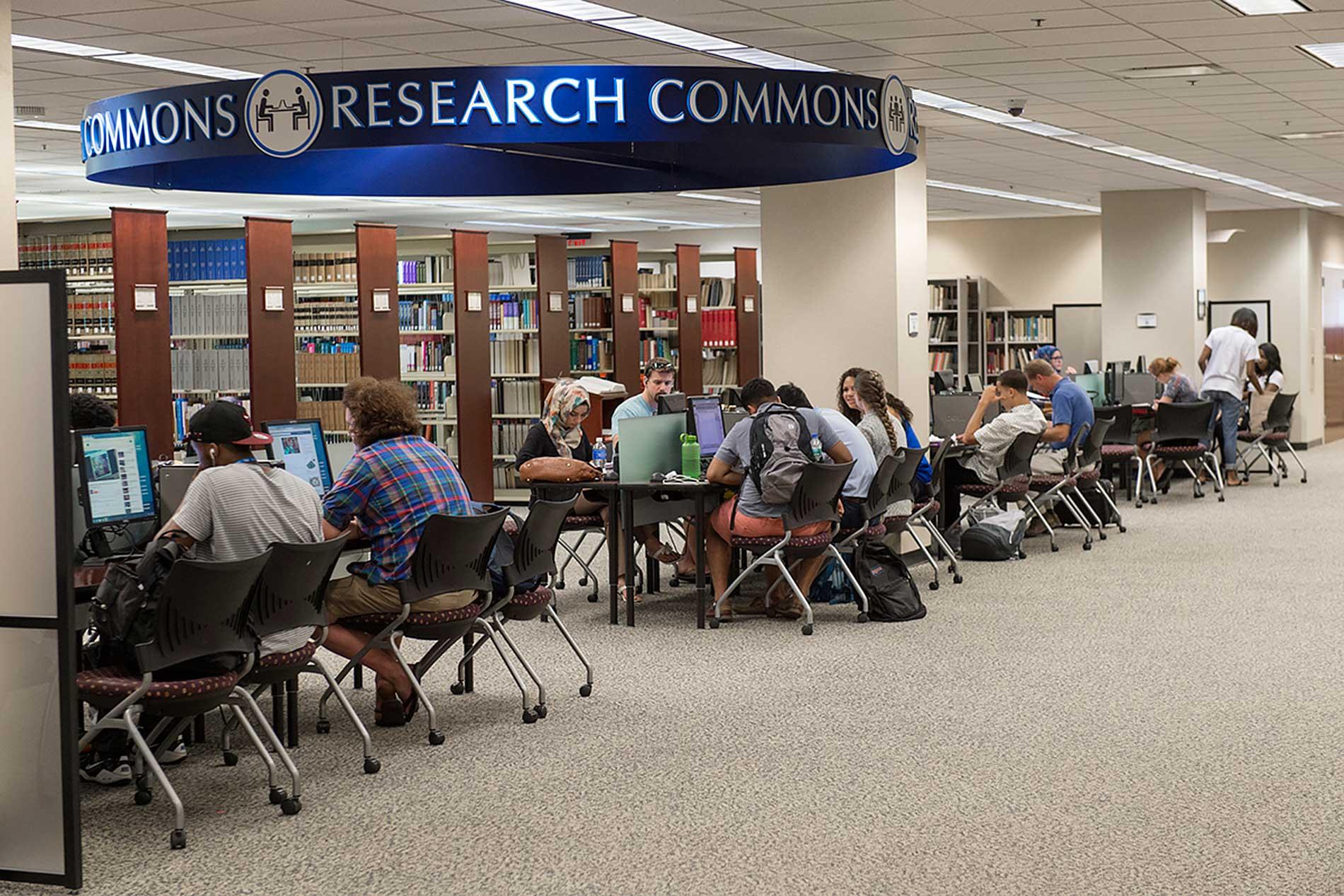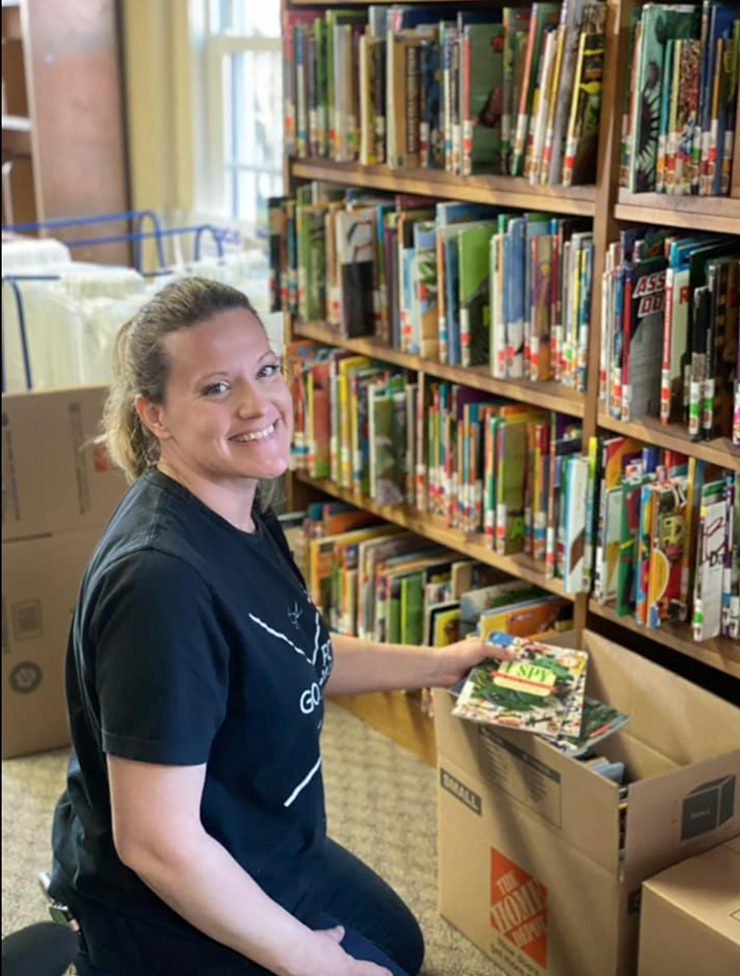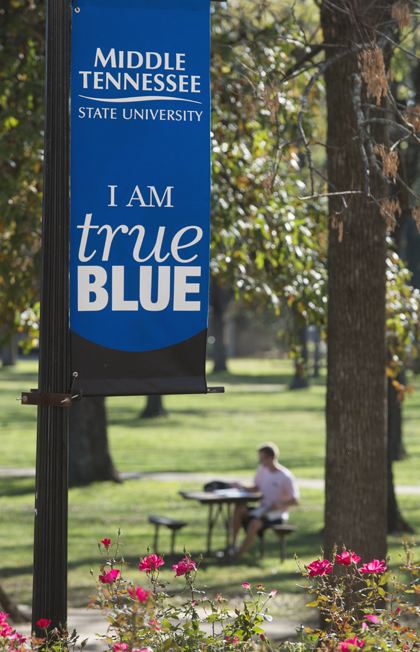
Library Science
Library Science Graduate Program. Online, affordable, and versatile education for 21st-century professionals.
Library Science, Dual MLS-MSW Degree Program, M.L.S.
The role of the librarian is continually evolving to meet the needs of our communities from the smallest of rural counties to large cities. Librarians specialize in organizing and providing information through a variety of media, including books, online databases, and classes.
The MTSU Master of Library Science (MLS) Program prepares students to fulfill a variety of roles. The program is intended to prepare graduates to lead and educate in school, public, academic, and corporate libraries. It was recognized recently as one of the most affordable online Master in Library Science programs in the U.S. The program consists of 36 credits, with all coursework 100% online and asynchronous except for one field experience to help produce practice-ready librarians. Each course is tailored to individual student interests, and students are allowed to propose alternative electives in other disciplines.
Our school librarian endorsement track equips students to teach PK–12 students everything from picking out a book to research methods to social media literacy, as well as to manage the book and online collections and budgets. Students can also focus on public, academic, or special librarianship, with emphasis on specific services and materials needed by those populations and the management of the organizations.
The vision of the Library Science Program is to meet society's current and future needs pertaining to the discovery, acquisition, organization, provision, and ethical and effective use of information regardless of media format.
The mission of the Library Science Program is to prepare the next generation of 21st-century information professionals through impactful research, creative entrepreneurship, learner-centered teaching, and innovative professional practice.
The themes of building a learning environment, leadership, technology, and a user-based mindset are reflected in every aspect of MTSU's program.
The MLS Program, along with the College of Education, is CAEP accredited.
Professional Licensure Disclosure
The Master of Library Science (M.L.S.) program at Middle Tennessee State University (MTSU) is seeking precandidacy status by the Committee on Accreditation of the American Library Association. Precandidacy status is an indication that MTSU’s M.L.S. program has voluntarily committed to participate in the ALA accreditation process and is actively seeking accreditation. Precandidacy does not indicate that the program is accredited nor does it guarantee eventual accreditation of the program by ALA.
Students in the Master of Library Science program may seek an initial teaching license and should consult with the program director and MTSU licensure office. The MTSU College of Education’s teacher licensure preparation programs are accredited by the National Council for the Accreditation of Teacher Education (NCATE) and are eligible for accreditation by the Council for the Accreditation of Educator Preparation (CAEP). Students should be aware that licensure requirements vary from state to state and are subject to change. MTSU has not made a determination whether a specific program will meet all of the requirements of another US state or territory. MTSU recommends that students who plan to seek licensure outside the state of Tennessee contact the appropriate licensing agency and discuss their plans with their advisor. To obtain current information about each state’s and territory’s licensure requirements and any additional regulations, students should consult the US Department of Education’s website for state contacts at https://www2.ed.gov/about/contacts/state/index.html.
Graduates of MTSU teacher education programs certified to teach in Tennessee are eligible for certification reciprocity in many states. Reciprocity is not an automatic or complete transfer of certification, thus individuals should consult the Tennessee Department of Education (TDOE) site at https://www.tn.gov/education/licensing.html and the National Association of State Directors of Teacher Education and Certification (NASDTEC) site at https://www.nasdtec.net/page/Interstate as well as the US Department of Education state contacts site for information about any additional state requirements.
News Briefs

MLS student focusing on diversity, inclusion in classroom with scholarship
Thipphavanh Souksanh, who is set to graduate from the Masters of Library Science program next spring, was awarded the Diversity in School Librarianship Scholarship sponsored by the Tennessee Association for School Libraries (TASL). The award recognizes the need for school librarians who reflect the diversity of Tennessee's students, schools, and communities, and it rewards the scholarship to students from historically underrepresented racial/ethnic groups pursuing a graduate degree in library/information science, according to TASL's website.
Souksanh, who goes by Tip, was born in a refugee camp in Thailand in the late 80s. Her family escaped Laos years earlier along with almost one-tenth of Laos' three million citizens who fled after the country fell to communist forces. Souksanh said her grandfather went to Thailand first before he brought over his family which included Tip's mother and three uncles.
"As a child, when you see anyone who looks like you or you have the same background it piques your interest," she said. "When you can see someone who looks like you, you can almost see yourself. So, in my school, I try to be that for my kids."
Souksanh said one of the core values of librarianship is equity, diversity and inclusion. She says that doesn't just mean making programs and books available to all people, but also having different things reflected in the materials that are actually on the shelves.
"I try to find books that represent what I look like, what my students look like, and the disabilities I have in my classroom," she said. "So, when people know and learn more about it, they have more of an openness to have conversation with people."

MTSU alumna credits library science program with boosting skills, career
"I have been in the education field for 20 years," Michel notes, tracing the route of her career. "After my first year as the Library Assistant, I knew that being a librarian was what I wanted to do for the rest of my career. Having the experience of teaching for so long coupled with the amazing education I received from MTSU has given me the confidence and knowledge I need to thrive as a school librarian."
News Briefs
MLS student focusing on diversity, inclusion in classroom with scholarship

Thipphavanh Souksanh, who is set to graduate from the Masters of Library Science program next spring, was awarded the Diversity in School Librarianship Scholarship sponsored by the Tennessee Association for School Libraries (TASL). The award recognizes the need for school librarians who reflect the diversity of Tennessee's students, schools, and communities, and it rewards the scholarship to students from historically underrepresented racial/ethnic groups pursuing a graduate degree in library/information science, according to TASL's website.
Souksanh, who goes by Tip, was born in a refugee camp in Thailand in the late 80s. Her family escaped Laos years earlier along with almost one-tenth of Laos' three million citizens who fled after the country fell to communist forces. Souksanh said her grandfather went to Thailand first before he brought over his family which included Tip's mother and three uncles.
"As a child, when you see anyone who looks like you or you have the same background it piques your interest," she said. "When you can see someone who looks like you, you can almost see yourself. So, in my school, I try to be that for my kids."
Souksanh said one of the core values of librarianship is equity, diversity and inclusion. She says that doesn't just mean making programs and books available to all people, but also having different things reflected in the materials that are actually on the shelves.
"I try to find books that represent what I look like, what my students look like, and the disabilities I have in my classroom," she said. "So, when people know and learn more about it, they have more of an openness to have conversation with people."
MTSU alumna credits library science program with boosting skills, career

"I have been in the education field for 20 years," Michel notes, tracing the route of her career. "After my first year as the Library Assistant, I knew that being a librarian was what I wanted to do for the rest of my career. Having the experience of teaching for so long coupled with the amazing education I received from MTSU has given me the confidence and knowledge I need to thrive as a school librarian."

Library science degrees allow graduates to work in any setting in which they have interest. Medical, legal, academic, public, children, business are a few types of libraries.
Employers of MTSU alumni include
- Battle Ground Academy
- Bedford County Schools
- Bradley County Schools
- Campbell County Schools
- Cannon County Schools
- Coffee County Schools
- Five Star Technology Solutions, Sellersburg, Ind.
- Franklin County Schools
- Franklin Schools District
- Gibson County
- Hamilton County Schools
- Lake County Schools
- Lincoln County Schools
- Linebaugh Public Library
- Maury County Schools
- Metro-Nashville Public Schools
- Murfreesboro City Schools
- Nashville Public Library
- Rutherford County Schools
- Sumner County Schools
- Williamson County Schools
- Wilson County Schools
The following sites are also helpful links to career possibilities:
American Library Association JobLIST
https://joblist.ala.org/
Tennessee Library Association Career Center
https://www.tnla.org/networking/opening_search.asp



VISION of the Master of Library Science (MLS) Program
To meet the information society's current and future needs pertaining to the discovery,acquisition, organization, provision, and ethical and effective use of informationregardless of media format.
Mission
To prepare the next generation of 21st century information professionals through impactful research, creative entrepreneurship,learner-centered teaching, and innovative professional practice.
Student Learning Outcomes
Upon completion, MLS Program graduates and endorsement completers should be able to:
- Represent the profession according to professional codes and standards and accordingto community expectations
- Appreciate and address the information needs of diverse (access, ability, location,identity) communities
- Embrace opportunities for practice in all facets of librarianship and other informationprofessions
- Engage in advocacy and outreach for the profession of librarianship and other informationprofessions
- Create and sustain robust information organizations of all types and sizes
- Advance the Library and Information Science discipline and advance information professionsthrough innovative: research; entrepreneurship; teaching; and, practice
Goals
The MLS Program at MTSU will provide candidates:
- With customizable curricula that is grounded in library and information science theoryand practice that they can tailor to meet their interests and needs for continuedgrowth and development as an information professional;
- With an appreciation of the importance of advocacy for their profession and for theirinstitutions, which provide access to information resources;
- With an initiate's attainment of the American Library Association's (ALA's) Core Competencies of Librarianship within the Standards for Accreditation of Master's Programs in Library and Information Studies articulated and enforced by ALA, and other related standards such as the AmericanAssociation of School Librarianship's ALA/AASL/CAEP School Librarian Preparation Standards (2019).
The MLS Program develops and encourages collaborative relationships with librariesthat are willing to provide professional initiation field experiences so that candidatesreceive a diverse and effective practitioner's experience through pedagogical supportexemplified by the Program's coursework.
Program Objectives
- Job placement for graduates/completers (endorsement seeking) of the MLS Program
- 80% of all MLS Program students will have secured a position in librarianship or a similar information-based profession (e.g., librarian, archivist, museum staff, knowledge manager, indexer) or information-based organization within one year following their graduation/completion of their degree or non-degree plan of study.
- Professional skills of MLS Program graduates or completers (endorsement seeking)
- 80% of employers of the MLS Program's graduates and/or our graduates themselves will respond in some form of agreement that our graduates/they have the skills and attributes to become and remain successful information professionals.
- Satisfaction determination of MLS Program graduates/completers (endorsement seeking)
- 80% of all MLS Program student graduates will respond in some form of agreement that they are satisfied with their graduate education.
Values
The MLS Program subscribes to the Core Values of Librarianship put forth by the American Library Association (2019) and to specific values that the program holds.
The program supports the mission of the College of Education with student-centered learning environments through:
- Excellence in teaching
- Basic and applied research
- Creative endeavors
- Quality advisement
- Mentorship from practicing librarians
- Diverse field experiences
- Diverse partnership programs
Resources
About • Careers • Degrees • Requirements • Faculty • Vision • Resources • Outcomes • Online
Handbooks
MTSU Resources
Professional Associations
- American Library Association
- American Association of School Libraries
- Tennessee Library Association
- Tennessee Association of School Librarians
- TN Education Job Board
Employment Aids
- ALA Job List
- MTSU Alumni Career Services
- Interview Tips from “Mr. Library Dude”
- Cover Letter Cliches
- Letter-Writing Tips
Library Blogs
- Adventures of Library Girl
- Bookshelves of Doom
- A Bookshelf Monstrosity
- The Busy Librarian
- The Daring Librarian
- The Horn Book
- The Library Voice
- Mr. Library Dude
- Nerdy Book Club
- Neverending Search
- Swiss Army Librarian
- Tales from a Loud Librarian
- TLC=Tech+Library+Classroom
- Tweendom
- The Unquiet Librarian
- Waking Brain Cells
Scholarships
Accreditation Information
MLS Program Statistics
| Fall To Fall Student Retention | Average Time To Completion Of The MLS Degree | Percentage Of Graduates Holding Positions Relevant To The MLS Within 12 Months Of Degree Completion | |
|---|---|---|---|
| 2021-2022 | 90.5% | 21.3 months | 100% |
| 2020-2021 | 87.3% | 19 months | 80% |
| 2019-2020 | 88.6% | 17 months | 100% |
Accreditation Documents
2021
- American Library Association – Pre-candidacy Application Document
- American Library Association – Pre-candidacy Acceptance Letter
2020
- American Library Association – Pre-candidacy Application Document
- American Library Association – Pre-candidacy Acceptance Letter
Fall 2019
- American Library Association – Pre-candidacy Application Document
- ALA Pre-candidacy Acceptance Letter
Fall 2016
Assessment Collection and Use
At the end of each course:
- Input on the success of the assessments is solicited from the students in the class. (Item 1-2 in Table 3)
- The instructor notes comments and questions made during the class as indications that some clarification may be needed in the assignments. (Item 1-3 in Table 3)
At the end of each semester:
- The instructor presents the assessment results to the program faculty. The following are considered: revision of any assessment artifact, reassignment of goals to another course, modification of objectives. (Item 1-1 in Table 3)
- Send curriculum for the MLS to the MLS Advisory Council for suggestions and commentary.
- Make formal evaluation each semester at the university level. The instructors examine the results when they become available (2 months after class ends).
May of each year:
- The program coordinator collects data. Convey results to the instructors who meet to discuss which courses need complete revision or partial.
August of each year:
- Survey alumni by the Library Science Alumni Council for comments on the program effectiveness in preparing them to be librarians. Solicit suggestions.
Not yet in place, is a system to solicit input from employers of graduates. The LSAC is charged with creating the system for an annual data collection from employers.
The program wishes to seek ideas from all stakeholders in order to keep the program as a responsive, forward-looking leader for librarianship.
Table 3: Procedure to collect evidentiary data
| Practice | Item 1 | Item 2 | Item 3 |
|---|---|---|---|
| Data Collection | Meeting minutes | End-of-course surveys | Comments from class |
| Evaluation Process | Exit Portfolio | Alumni surveys | MAC input |
| Revision Process | Program Faculty minutes of meeting | Changes recorded | End of year evaluation of results |
What does the program do with the data?
Assessment Use
At the end of each semester:
The instructor considers revision of any assessment artifact, reassignment of goals to another course, modification of objectives.
Instructors review evaluations and choose an area of weakness for improvement.
May of each year:
Program revision occurs at the end of each year. Student achievement is reviewed.
August of each year:
Alumni surveys point the way for revisions in curriculum. Suggestions are implemented if possible.
December of each year:
Employer surveys are reviewed. Curriculum is reviewed in light of these surveys.
The program seeks ideas from all stakeholders in order to keep the program as a responsive, forward-looking leader for librarianship.
Praxis
Library Media Specialist Test 0311 -- Minimum score is 146
Praxis registration Information
- The Praxis Tests
- Praxis Study Guide available from ETS
Scores must be sent to MTSU for endorsement.
Praxis Study Guides
These items are essential resources:
- Standards for the 21st Century Learner
- Empowering Learners: Guidelines for School Library Media Programs
- ALA documents (Intellectual Freedom, Library Bill of Rights and the interpretations, etc. are available from the ALA
Study Guides

CONTACT US

Please fill in the form below and we will contact you very soon








